From the Ground Up: Matt Hall and Chris Ziems of High Mountain Timber
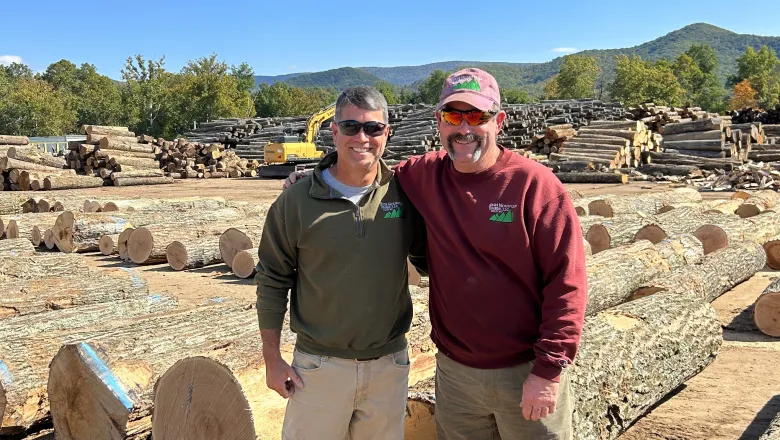
Customer Feature Stories
In the heart of the Appalachian Mountains of West Virginia, Matt Hall and Chris Ziems have built a timber empire. The pair met while working together at Coastal Lumber Company in the 1990s and in 2002, they took their combined considerable experience and branched out on their own to form High Mountain Timber (HMT) in Dailey, West Virginia, where they’ve been going strong ever since.
Matt Hall is originally from Rockville, Maryland but he had family ties in West Virginia. He graduated from West Virginia University (WVU) with a degree in Forest Resources Management and began working for Coastal Lumber Co. straight out of college in 1990. Chris Ziems is originally from Toledo, Ohio and graduated from the forestry program at Glenville State College, then stayed to work for Hinkle Lumber Company in Buckhannon following graduation. Matt and Chris had the opportunity to get to know each other while buying timber together at Coastal Lumber Co. for about five years. Then they both transitioned to work for Appalachian Forest Products where they served as foresters, buying timber and managing several log crews.
In 2002, they decided to take a leap of faith and start their own timber company in Randolph County, a major hub for the industry. They were both very grateful to have the support of their families as they took this leap, and HMT is now proud to employ Meghan Hall, Matt’s wife, as the office manager, bookkeeper, human resources director, etc. and Samantha Hall, Matt’s daughter, as the director of sales and marketing for the growing by-products division. Chris’s wife, Sarah, has played a support role with Chris on equipment and yard maintenance over the years, and while his two children are not directly involved in the business, they have always been supportive.
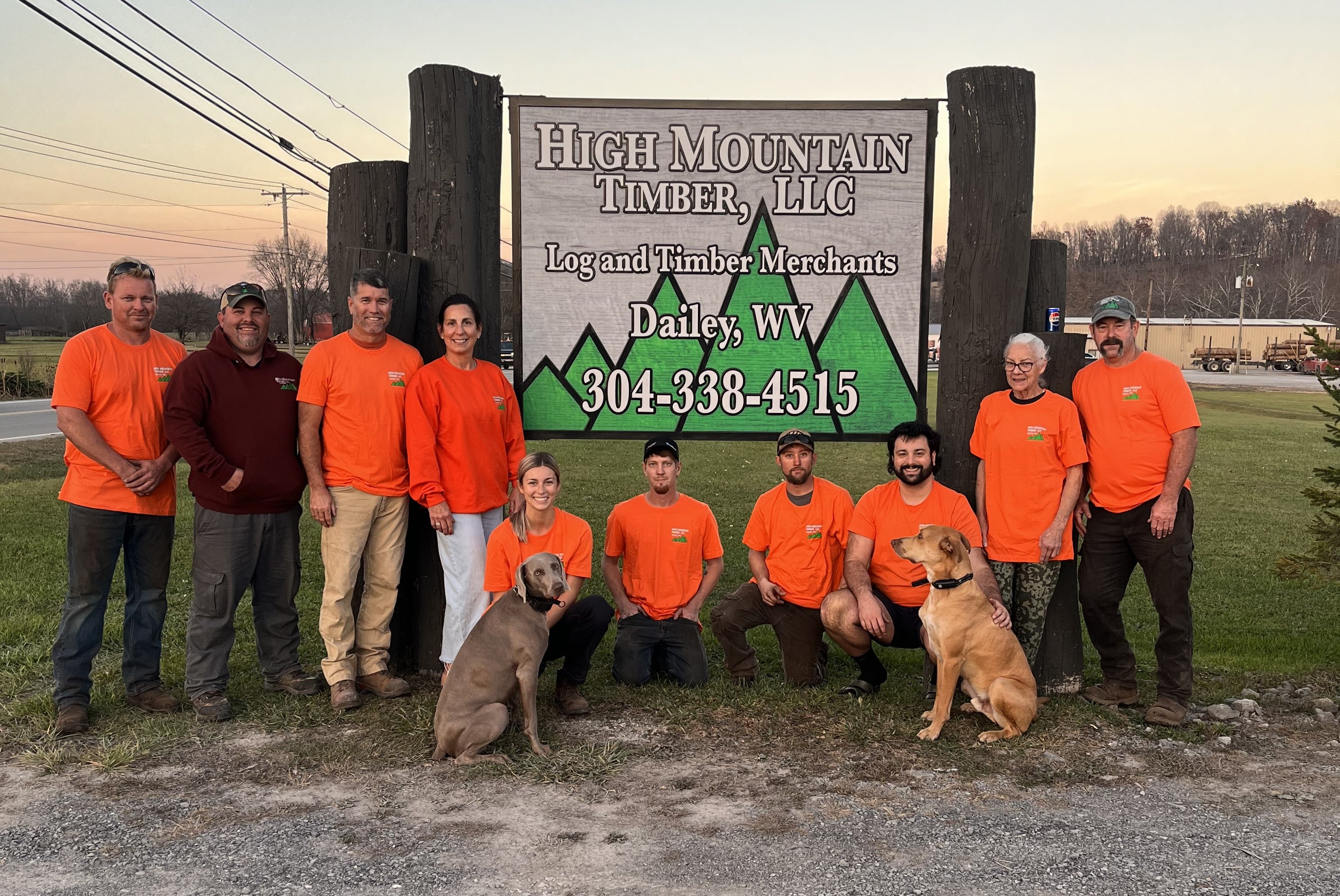
HMT was quite literally built from the ground up. When Chris and Matt started out, they worked out of their pickup trucks and had an office at Matt’s home. As the company began to grow, they bought a shed to serve as their office. Finally, in 2013, they built an office building and were able to bring Meghan on full-time. Samantha started working for HMT part-time remotely in a marketing role. She graduated from WVU as well, with a degree in Communications and Public Relations, so she has been an asset to the team in growing their by-products division. This division was actually started by the Halls’ older son, Robert, and was born from a need to manage their waste when the company began debarking their logs to export. Robert now helps at HMT when he can, but works full-time as a teacher. Since Samantha came on board full-time, she has been able to develop and grow the program. Mulch and firewood are the main by-products. The bark that comes off of the logs is broken down into mulch, while the wood chunks from manufacturing the logs becomes firewood.
“We’re trying to use the whole tree, from veneer to pulpwood,” said Matt. HMT sells their mulch and firewood through both retail and wholesale outlets. While by-products are by no means the bread and butter of the operation, this facet of their company has allowed them to become more environmentally conscious while bringing in additional revenue.
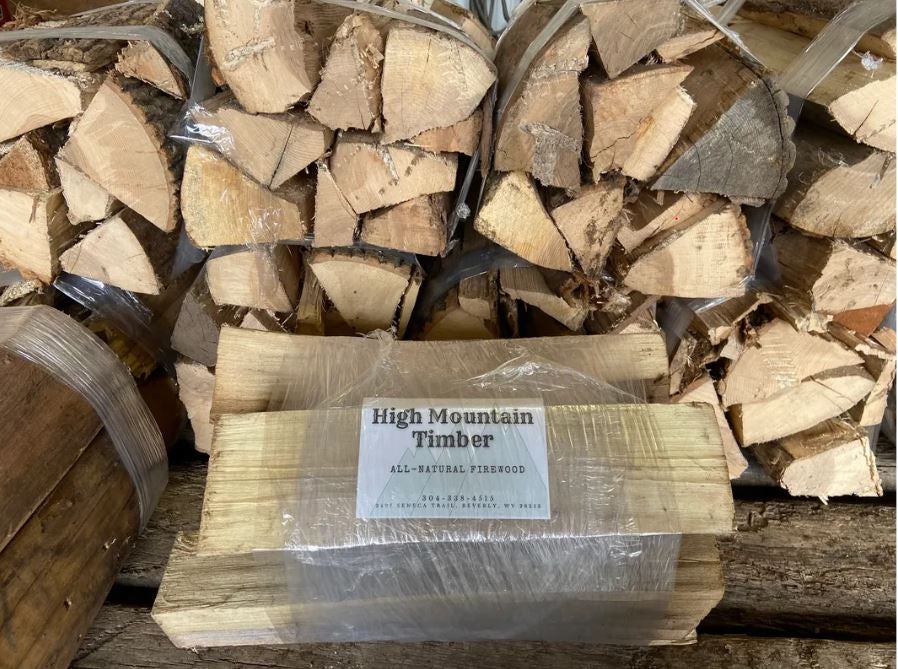
In addition to the headquarters location in Dailey, which consists of the office and main log yard, HMT also owns a 10-acre yard a few miles south, in addition to thousands of acres of land, from which they harvest timber. However, more than 90% of the timber is bought from private landowners. Matt and Chris employ a head forester, Jason Brock, who purchases all of the timber standing then runs three to four crews to harvest and truck the timber to the main yard for processing before the logs get shipped out. “Jason scouts the local area, deals with the private landowners, cruises the timber and estimates its worth in board feet volume. Then he’ll make an offer to the landowner and negotiate the contract. After the purchase, he handles the log crews that come in to harvest the property,” shared Matt.
Matt and Chris are in close communication with Jason throughout the process as he manages the different sites. The loggers harvest everything and bring it into the main yard, where it is then sorted, scaled, graded, processed and, finally, sold. Chris primarily works to clean up the logs and prepare them for sale, while Matt primarily coordinates buyers and builds loads that are either exported or sold domestically, though they both wear many hats, and fill in anywhere when needed.
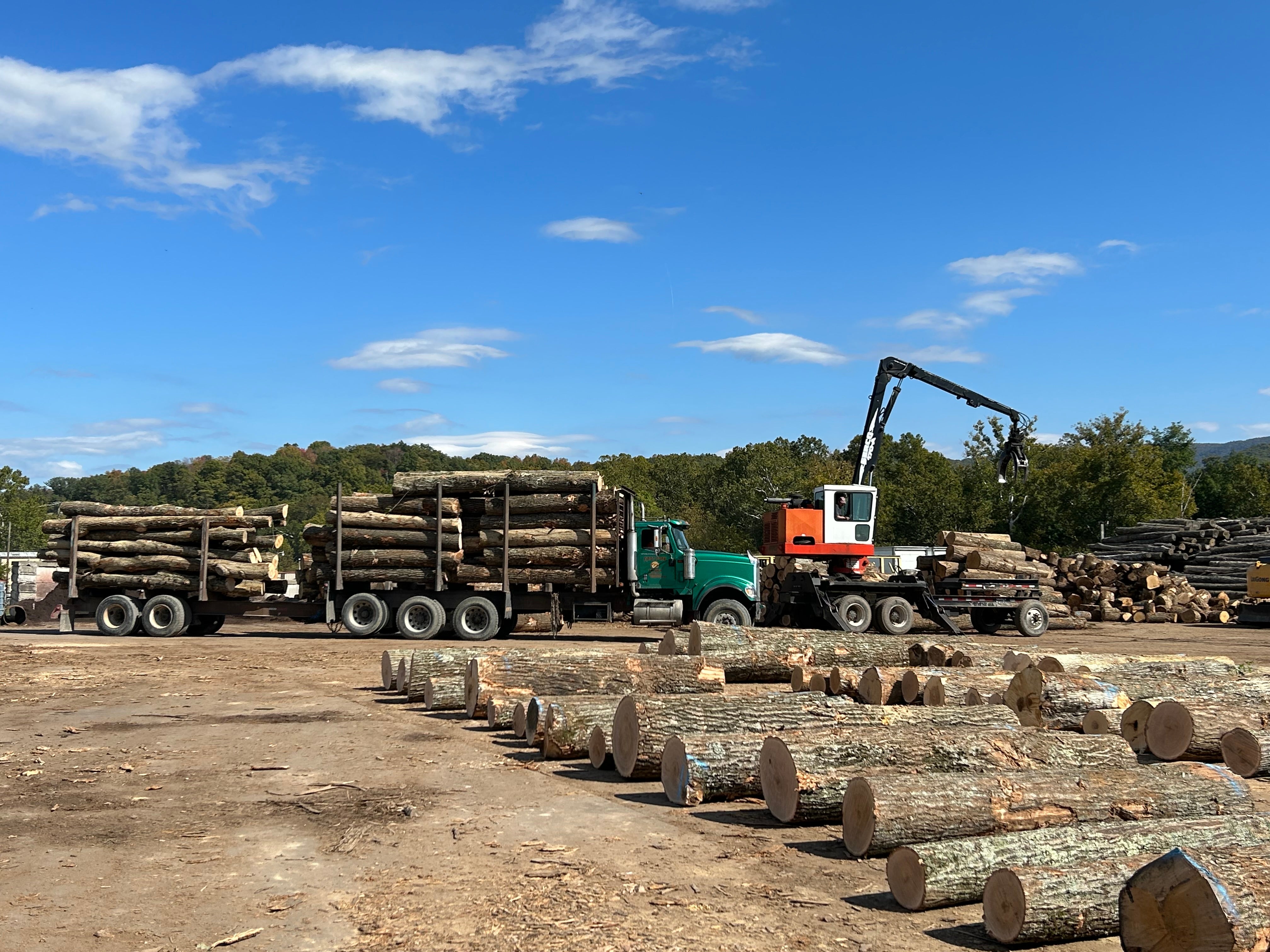
The main challenges HMT faces are labor and trucking. Labor has been an issue across the region for several years now, so they have had to maximize efficiency within their team when they’ve been unable to hire more labor. Trucking companies experience labor issues as well, which puts a strain on shipping and delivery schedules. HMT leverages both the Port of Virginia in Norfolk, as well as the Virginia Inland Port in Front Royal, so trucks come to the yards multiple times per week to take logs back to both ports for export or domestic distribution. Much of the higher end veneer is exported, while the majority of saw logs stay within a three or four state radius. This breakdown also depends on the ever-changing markets, tariffs, interest rates and the housing market. Right now the timber market is a bit unsteady, which has been hard on the smaller companies. During the last economic downturn back in 2008, a number of timber companies went out of business, including Coastal Lumber Co. The bulk of HMT’s products end up in flooring, furniture, trim and cabinets, so demand is closely tied to the housing market.
It is clear that Matt and Chris are both passionate about what they do. They both wanted to enter the forestry industry from a young age. As they have grown in their business, their priorities have shifted some. They are content with their current production level and understand the challenges in buying more land and the competition that exists in the region. The business has been around long enough at this point that Matt and Chris are starting to log areas again that they harvested when they were first starting out. They are happy to see the business come full circle in that way and to see that the management practices put in place have allowed the land to produce.
Matt and Chris have enjoyed a great working relationship with Farm Credit over the years. Matt shared, “Farm Credit understands our industry, and they’re not afraid of it. They know agriculture very well, but they also understand timber and its long-term nature. It’s hard to explain to people that we’re going to manage land throughout our lifetime and get one, two or three cuttings off of it, then plan for the next generation to have a harvest.”
When asked about their favorite aspect of the business, Matt and Chris gave very different answers, but that is what makes them such great partners.
“I really like managing the business end of it – dealing with other businesses, building relationships, learning what their needs are, then taking that product from the woods to market. Trying to coordinate loggers, truckers and buyers to get your product all over the world is challenging but also very rewarding,” answered Matt.
“I like the work. I keep saying I’m getting too old to do it, but every day I go out there and do it. I get to do everything – run the chainsaw, run the excavator, run the debarker, load trucks, unload trucks and do most of the maintenance,” answered Chris.
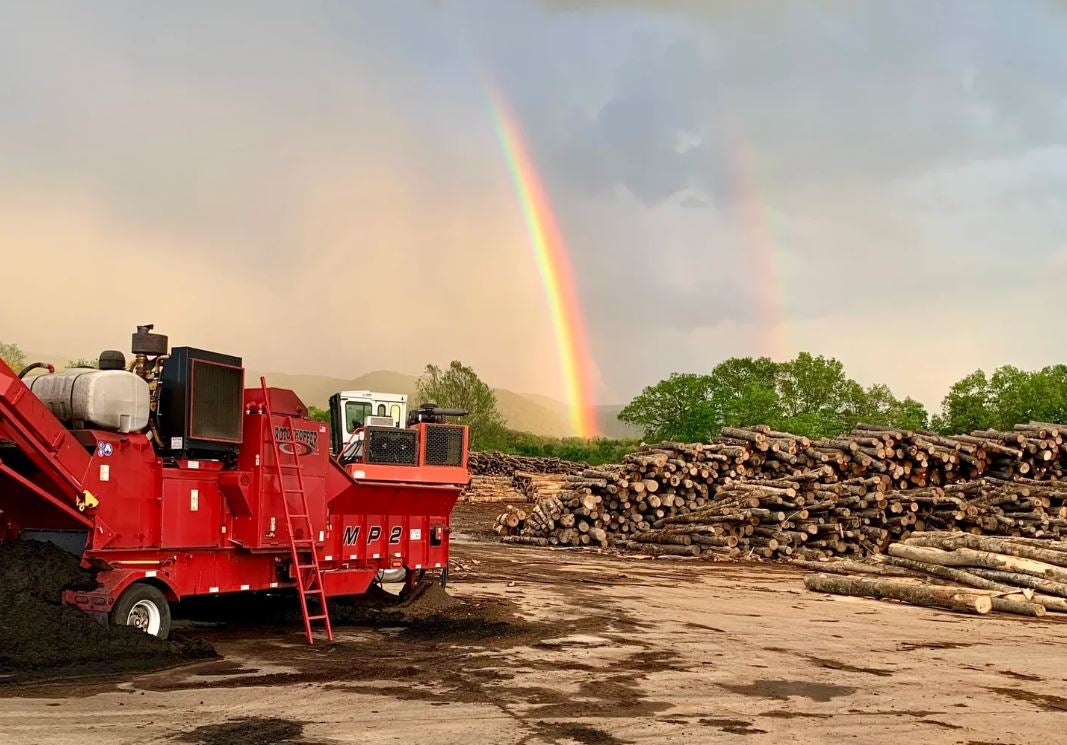
Matt and Chris both shared some advice to young foresters or people interested in the industry. “You better be willing to live, eat and breathe it every day. If you have a doubt, don’t do it. And the hard work does pay off,” offered Matt. “There’s no end – you’re constantly getting ready for the next thing. You’ve got to be committed,” offered Chris.
Matt and Chris are proud of the business they’ve built and the fact they built it in a highly competitive market, right under the noses of several large companies. They credit their success with staying flexible and being able to adapt to changes quickly. Building HMT from the ground up was extremely risky and Matt and Chris put their all into it. Rather than paying themselves that first year, Matt and Chris chose to re-invest almost everything they made back into the business. Thankfully, both Meghan and Chris’s wife, Sarah, worked full-time and provided their families with a steady income as HMT got off the ground.
Today, they employ four people on the yard, in addition to Meghan and Samantha in the office, and work with about 18 men on the subcontracted crews. Plans for the future include more of the same from the log yard, with growth in the by-products division, which has already grown 50% in the last two years. They have even started purchasing other companies’ waste to generate more supplemental income. HMT is comfortable at their current level of harvesting and processing timber, with three or four crews running, even though their yard can handle six crews. Matt and Chris feel they are most efficient at their current level and they have found a groove there. There’s no slowing down in sight.
Learn more about High Mountain Timber, LLC: https://highmtntimber.com/
This feature story was published in the December 2023 Leader Magazine. Access the full magazine (digital version) HERE.